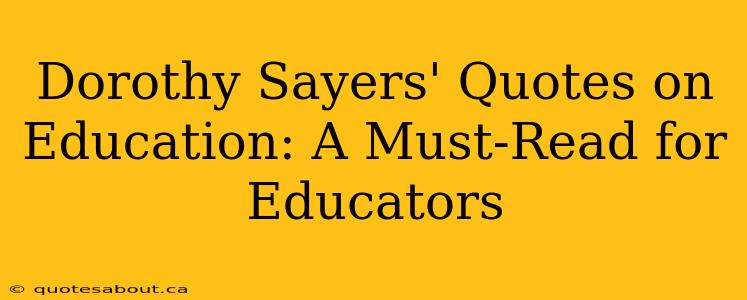Dorothy L. Sayers, the celebrated British writer known for her Lord Peter Wimsey detective novels, was also a passionate advocate for education reform. Her insightful essays and speeches on the subject remain remarkably relevant today, offering a potent critique of outdated pedagogical approaches and a compelling vision for a more holistic and effective system. This article delves into some of her most impactful quotes, exploring their meaning and enduring significance for educators in the 21st century. We'll examine her perspectives on the purpose of education, the importance of critical thinking, and the need for a balanced curriculum.
What Did Dorothy Sayers Believe About Education?
Sayers' philosophy of education stemmed from a deep belief in the inherent potential of every individual. She argued against a system that prioritized rote learning and vocational training at the expense of cultivating critical thinking, creativity, and a broad understanding of the world. She believed education should equip individuals not just for a job, but for a full and meaningful life. This holistic approach is reflected in many of her powerful statements on the subject.
Why is Dorothy Sayers Relevant to Modern Education?
Sayers’ criticisms of the educational system resonate strongly even today. While the specifics of the educational landscape have shifted, many of the underlying issues she identified—a lack of critical thinking skills, an overemphasis on specialization too early in a student's development, and a disconnect between academic learning and real-world application—persist. Her emphasis on the importance of developing well-rounded individuals equipped to engage with the complexities of the world remains a vital and timely message.
What is the Significance of Dorothy Sayers' Views on Education?
The enduring significance of Sayers' views lies in her powerful articulation of the inherent value of a liberal arts education. She championed a curriculum that fostered intellectual curiosity, creativity, and the ability to think critically and independently. This approach, she argued, was crucial not only for individual fulfillment but also for the advancement of society as a whole. Her ideas provide a valuable counterpoint to the increasingly vocational and specialized focus of many modern education systems.
What are Some of Dorothy Sayers' Most Famous Quotes on Education?
Many of Sayers' most famous quotes on education are taken from her seminal essay, "The Lost Tools of Learning." Here are a few, along with explanations of their significance:
"The whole point of education is to turn the mind, not to load it."
This quote perfectly encapsulates Sayers' central argument against rote learning. She believed education should be about developing the capacity for independent thought and critical analysis, not simply memorizing facts. The emphasis is on cultivating intellectual agility and the ability to process information thoughtfully, rather than passively absorbing it.
"We are always being told that education must be ‘practical’ and ‘vocational.’...What we need is not more technicians but more human beings."
This highlights Sayers’ concern with the overemphasis on vocational training at the expense of a broader, more humanistic education. She recognized the importance of preparing students for the workforce, but emphasized that true education should go beyond equipping individuals for specific jobs; it should cultivate well-rounded individuals capable of critical thinking, empathy, and ethical reasoning. The quote serves as a potent reminder that education should nurture the whole person, not just a skilled worker.
"A man who has been trained to think for himself is far more valuable to society than a man who can only repeat what he has been told."
This quote underscores the importance of critical thinking as a cornerstone of a meaningful education. Sayers championed an education that encourages questioning, debate, and independent thought, recognizing that a passively receptive mind is ill-equipped to navigate the complexities of the modern world. A truly educated individual, according to Sayers, is one who can form their own opinions and make their own judgments based on evidence and reasoned argument.
How Does Dorothy Sayers' Philosophy on Education Apply to Today's Students?
Sayers’ educational philosophy remains highly relevant to today's students. In a rapidly changing world, characterized by information overload and unprecedented technological advancements, the ability to think critically, solve problems creatively, and adapt to new situations is paramount. Her emphasis on a holistic, liberal arts education remains a valuable guide for educators striving to prepare students for the challenges and opportunities of the 21st century. Her ideas challenge us to consider whether we are truly equipping our students with the tools they need to thrive, not merely survive, in the world.
What are the Key Takeaways from Dorothy Sayers' Work on Education?
The key takeaways from Sayers' work are a call for a return to a more holistic, humanistic approach to education that values critical thinking, creativity, and a well-rounded understanding of the world. Her insights serve as a powerful reminder that true education is not simply about acquiring knowledge, but about developing the capacity to learn, to think, and to engage with the world in a meaningful and constructive way. Her work offers a timeless perspective on the true purpose of education and the essential skills required for a fulfilling and productive life.

